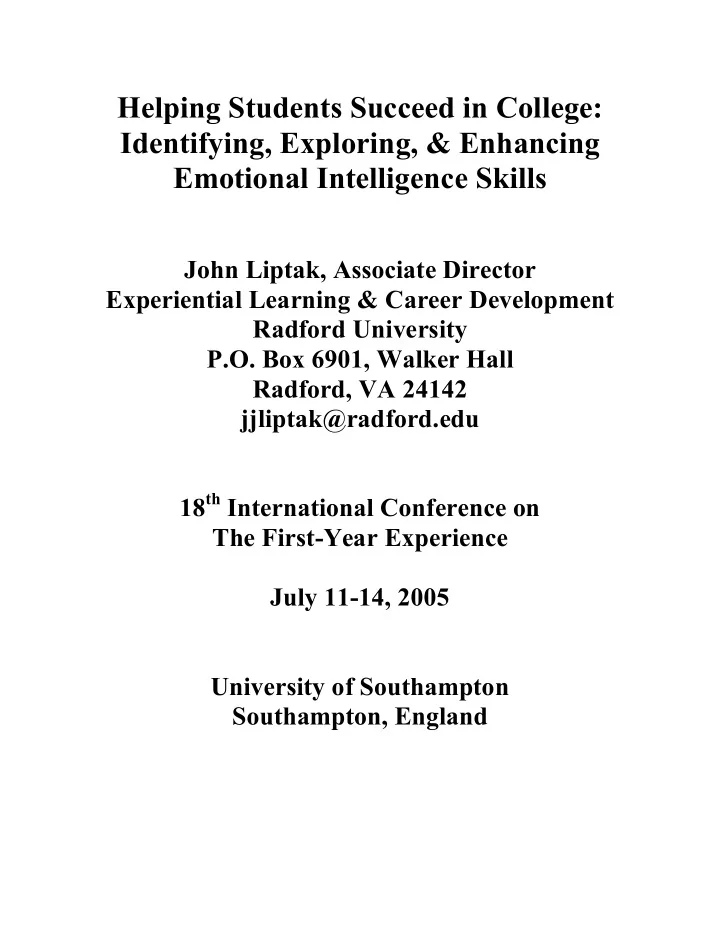

Helping Students Succeed in College: Identifying, Exploring, & Enhancing Emotional Intelligence Skills John Liptak, Associate Director Experiential Learning & Career Development Radford University P.O. Box 6901, Walker Hall Radford, VA 24142 jjliptak@radford.edu 18 th International Conference on The First-Year Experience July 11-14, 2005 University of Southampton Southampton, England
THE MOST IMPORTANT PERFORMANCE DIMENSIONS BEING SOUGHT BY PROSPECTIVE EMPLOYERS* #1 = Interpersonal Skills #2 = Ethics and Integrity #3 = Leadership #4 = Perseverance #5 = Knowledge *Shivpuri, S., & Kim, B. (2004). Do employers and colleges see eye- to-eye. NACE Journal (Fall, 2004), pp.37-44.
EMOTIONAL INTELLIGENCE DEFINED Goleman (1995) – A set of key skills, abilities and competencies that, unlike traditional Intelligence Quotient (IQ) which is primarily innate, can be learned by anyone. He writes that emotional intelligence include such skills as being able to motivate oneself, being persistent in facing obstacles and achieve goals, controlling impulses and delaying gratification, controlling one’s moods, thinking rationally, empathizing with others and hoping. Mayer, Salovey, and Caruso (2000) – A set of abilities that account for how a more accurate understanding of emotions often helps people solve problems in their emotional lives. They define emotional intelligence as the ability to perceive and express emotion, assimilate emotion in thought, understand and reason with emotion, and regulate emotion in the self and others. Howard Gardner (1983) – The ability to notice and make distinctions among other individuals and, in particular, among their moods, temperaments, motivations, and intentions. Liptak (2005) – A set of skills needed to be effective in life and career. These skills can be learned and include career management skills, personal competence skills, and interpersonal competence skills.
The Confluence Counseling Model* Personal Competence Skills Student & Employee Success Career & Job Social Search Competence Skills Skills *Liptak, J.J. (2005). Job Survival and Success Scale (JSSS) and accompanying professional manual. Indianapolis, IN: JIST.
Emotional Intelligence Skill Sets I. Personal Competence Be dependable Take responsibility Be trustworthy Self-Reflect Be autonomous Manage strong emotions Be conscientious Adapt easily to change Be aware of own feelings Show ethical behavior Remain optimistic Manage stress effectively Manage time effectively Develop a healthy lifestlye
II. Social Competence Be a team player Be cooperative Communicate effectively Know your interpersonal style Understand diversity Be awareness of others’ feelings Resolve conflicts effectively Be willing to take calculated risks Develop a social support network Show empathy Listen effectively Understand preferences Be service oriented/altruistic
III. Career Management Competence Develop your career Know your interest, skills, & personality Understand motivated values Build and transfer skills Lead and influence others Build a track record of success Develop a reputation as an employee Take initiative Be a lifelong learner Develop a career plan Find a mentor Satisfy needs through leisure Commit to personal excellence Find a job Create your own job Make career decisions
Five stages in learning emotional intelligence skills* 1. Understand why emotional intelligence skills are important. In this phase students usually ask, “How will it be of value to me?” 2. What are the student’s emotional intelligence skill deficits? Assess the student’s emotional intelligence weaknesses. Multifactor Emotional Intelligence Scale; Emotional Quotient Inventory; Job Survival & Success Scale. 3. Once a skill deficit area has been identified, help students explore how the lack of this skill can keep them from being successful in the workplace. “Skills Programs” are effective. 4. Use the skill more effectively. The role of the career counselor becomes on of a teacher and a model for the skill. 5. Practice the skill: The best learning takes place in various social settings. On a college campus, opportunities to practice emotional intelligence skills are everywhere. *Liptak, J.J. (In Press). Using Emotional Intelligence to help students succeed in college. Journal of Employment Counseling.
RESOURCES FOR ASSESSING AND TEACHING EI SKILLS JOB SURVIVAL & SUCCESS SCALE. JIST Publishing (www.jist.com) THE SELF-ESTEEM PROGRAM: Inventories, Activities, & Educational Handouts. Wellness Reproductions & Publishing (www.wellness-reources.com) THE SOCIAL SKILLS PROGRAM: Inventories, Activities, & Educational Handouts. Wellness Reproductions & Publishing (www.wellness-reources.com) THE STRESS MANAGEMENT PROGRAM: Inventories, Activities, & Educational Handouts. Wellness Reproductions & Publishing (www.wellness-reources.com)
HOW EI SKILLS ARE ASSESSED & TAUGHT DEVELOPMENTALLY AT RADFORD UNIVERSITY Freshman: University 100 Classes Sophomore: Career Development Classes Junior: Pre-Internship Classes Senior: Seminar Classes Everyone: “Thursday Night” Seminars
OTHER REFERENCES Gardner, H. (1983). Frames of Mind. New York: Basic Books. Goleman, D. (1995). Emotional intelligence. New York: Bantam Books. Mayer, J.D., Salovey, P., & Caruso, D. (2000). Models of Emotional Intelligence. In Ed. R.J. Sternberg’s Handbook of Intelligence (pp. 396- 420). Cambridge, UK: Cambridge University Press.
Recommend
More recommend